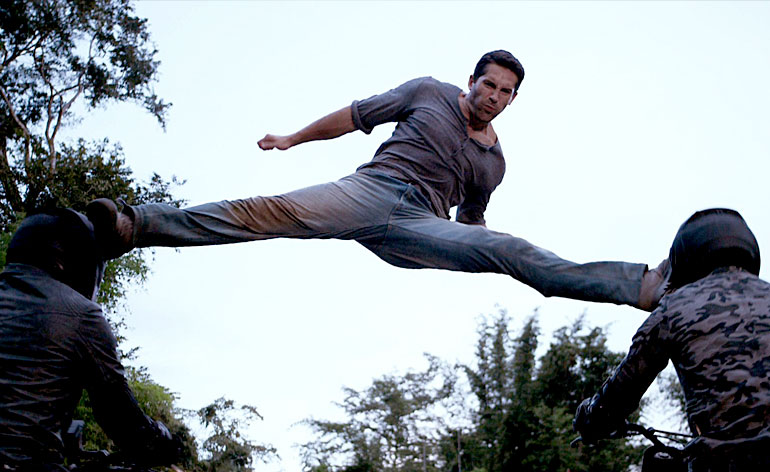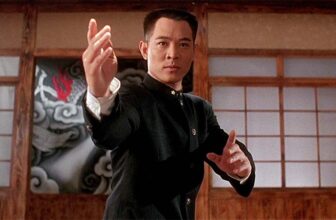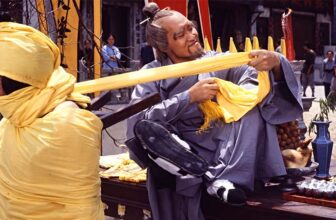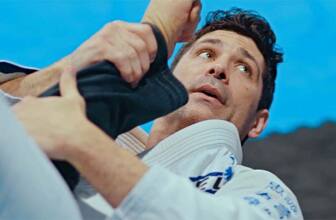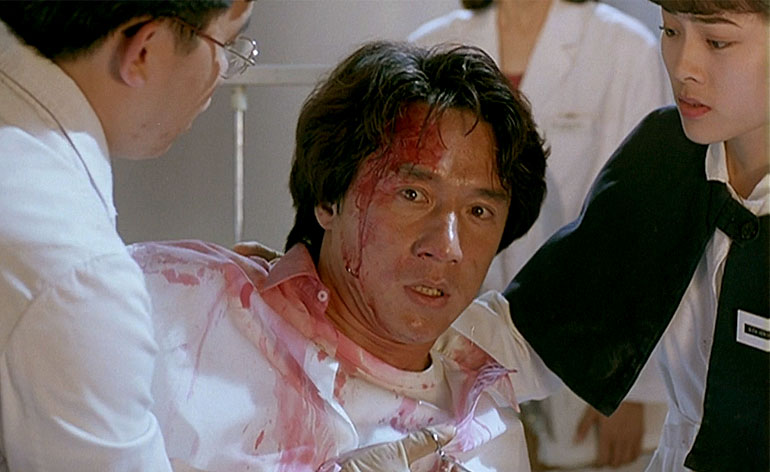
Jackie Chan stars in one of his most serious roles in a Hong Kong action film based on the real-life events surrounding the 1990 kidnapping of Chinese businessman Teddy Wang.
Trailer
Cast
Taking a break from his usual lighter-hearted characters, action legend Jackie Chan stars as “Inspector Eddie Chan”, who must track down the kidnapped businessman Wong Yat-fei.Burly actor Kent Cheng, who played “Lam Sai-wing” in “Once Upon a Time in China” and “Sergeant Fatty Po” in “Ip Man 2 & 3“, stars as a cop with dubious loyalties, “Inspector Hung Ting-bong”.
Making his movie debut is former Cantonese Opera star Law Kar-ying as “Wong Yat-fei”. A prolific film actor, he went on to appear in movies such as Jet Li’s “Dr Wai and the Scripture with No Words”, the Stephen Chow comedy “Forbidden City Cop”, Jackie Chan’s “Gorgeous”, and Donnie Yen’s “14 Blades”, to name but a few.
Legendary stuntman Blackie Ko appears as “Captain Ko”, and regular Jackie Chan stuntman and co-star Ken Lo appears as “Ng Kwok-yan”.
Plot
After a dramatic shootout, Inspector Eddie Chan of the Organised Crime and Triad Bureau, suffers from post-traumatic stress having had to shoot dead some armed robbers. Whilst he recovers, Chan is assigned to watch over businessman Wong Yat-fei who has suspicions of a kidnap plot against him. Wong’s suspicions are realised when a masked gang snatch him from his moving Mercedes in a daring vehicle chase. Determined to make amends, Chan’s search for Wong takes him from Hong Kong to Taiwan. The relentlessly driven Chan finds himself fighting his personal demons, mobsters, and his assigned partner, Inspector Hung.
Action
More crime drama than martial arts movie, this film sees Jackie Chan in “serious actor mode”, and the action set-pieces reflect this.
Jackie’s first bit of action sees him describing his involvement in a running shootout with armed robbers on the streets of Hong Kong. Jackie armed with only a revolver takes on several machine-gun wielding bad guys. There is some physical action with stuntmen rolling over the tops of speeding and crashing cars, and Jackie himself nearly getting crushed between two vehicles. Shown in flashbacks, the frenetic camerawork and fast edits lend the scene a raw and edgy energy.
When Wong and his wife are kidnapped in an innovative car-jack on the move, Jackie gives chase. In some ways, the scene plays out like a Hong Kong-style fight scene. Every impact hits hard as cars smash into each other or tumble and roll along the tarmac. Jackie drives down a near-vertical slope to catch up with the kidnappers, with several close-ups showing he is in the driving seat for much of the stunt. When a motorcycle cop gets wiped out and pushed along by a car, you have to wonder how the stuntman came out of it unscathed.
With the action moving to Taiwan, the local police send an armed squad to take out a Triad gang. A violent shootout erupts as Inspectors Chan and Hung arrive. Pursuing the gang across the rooftops, Jackie gives us glimpses of his agility as he negotiates the fire escapes and fights through scaffolding.
A brief altercation in an airport sees a more familiar Jackie Chan-style as he takes out a suspect with a pair of suitcases. Back at headquarters, the suspect challenges Chan to a fight. As ever, Jackie uses all the props around him in the fight choreography, but in keeping with the tone of the movie, every strike and impact feels much more brutal.
Chan then confronts Hung inside a derelict ship instigating a sequence of bruising high falls, as Jackie bounces around the rusting hull like a rag doll.
As Chan closes in on the gang he engages in a brutal three-on-one battle. Jackie is hit with shovels, chairs, tables and even television sets, in amongst the punches and kicks. Again, the choreography has many of Jackie Chan’s hallmarks, but is much more raw and violent. When Chan eventually catches up with Hung, actor Kent Cheng, although stunt-doubled in a few places, takes as hard a beating as anybody in the film. The sequence concludes with some huge explosions and fires that wouldn’t look out of place in a decent budget Hollywood movie.
Summary
In 1993, having made his name as an action performer first and foremost, and his most recent hits being the out-and-out comedies “Twin Dragons” and “City Hunter”, Jackie Chan wanted to prove to his critics that he was more than just a “stuntman”. As Inspector Eddie Chan, Jackie delivers one of the most serious, dramatic and best acting performances of his career, even to date, answering those critics.
However, when Jackie Chan makes a “serious” film, there is always a bit of a paradox. His core fans expect extravagant stunts, stylish choreography, and usually a little slapstick comedy. In “Crime Story” there are probably more shootouts than fight scenes, and there is not the slightest hint of humour from Jackie Chan.
There are still some impressive action sequences, and the production values on this film are much higher than other Hong Kong movies of the era. The fight choreography is for the most part done well, but is much more efficient, raw, violent and hard-hitting than you might expect from a Jackie Chan film. Being a “crime-drama”, it’s not as action-packed as the “Police Story” films that preceded itand so tends to sag in the middle-act as it delivers more of a story in place of the action.
If you want to see a very different Jackie Chan delivering a good, straight-acting performance, this is a very capable Hong Kong-style crime drama, with some hard-hitting stunts and shootouts. If you prefer more familiar Jackie Chan-style action and charm in a similar ilk, then I would look to the first three Police Story films.
Trivia
- Jet Li was the original choice to play Inspector Eddie Chan. While the film was still in pre-production, his agent Jim Choy was gunned down by Triads. The incident caused Li to opt out of making a movie about organised crime, as he did not want to attract the wrong attention, and he chose to star in “Tai Chi Master” instead.
- The writer of “Crime Story”, Teddy Chen, went on to direct Jackie Chan in “The Accidental Spy”, and returned to the crime genre as the writer and director of Donnie Yen‘s “Kung Fu Killer”.
- “Crime Story” is based on the real-life kidnappings of businessman Teddy Wang. He was first abducted on 12th April 1983, when his Mercedes was hijacked. He was taken away and chained to a bed for eight days until Nina Wang paid a ransom of HK$33 million. Wang was kidnapped for a second time on 10th April 1990. His abductors demanded HK$60 million. His wife paid an instalment of HK$34 million, but Wang was not returned. Several of the alleged kidnappers were caught and said that the 57-year-old Wang had been thrown into the sea from the boat where he was being held. His body was never found and he was declared legally dead in 1999.
- The climactic scene, in which a building is decimated by explosions, was filmed in the deserted Kowloon Walled City, which was scheduled for destruction at that time.
- In Japan, this movie was titled “New Police Story”.

